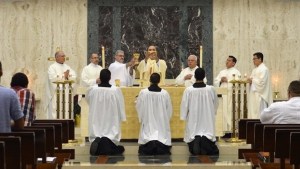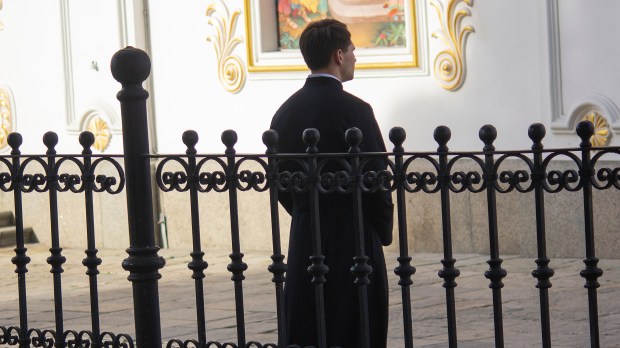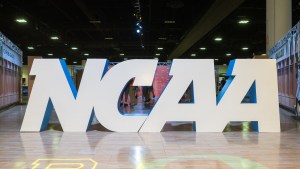Lenten Campaign 2025
This content is free of charge, as are all our articles.
Support us with a donation that is tax-deductible and enable us to continue to reach millions of readers.
Current screening processes at Catholic seminaries are thorough enough to make some seminary rectors wonder how applicants who are biological women presenting as men were able to gain admission.
“It’s not a surprise that some might try to do something like this, but what is a bit more perplexing and surprising is how they go about it and make their way into a seminary,” said Fr. Mark Doherty, rector of St. Patrick’s Seminary in Menlo Park, California.
Fr. Doherty and other rectors spoke with Aleteia in response to recent reports that an official at the United States Conference of Catholic Bishops was asking dioceses to be alert to possible future attempts of transgender women to apply to study for the priesthood. The official, Archbishop Jerome Listecki of Milwaukee, had sent a memo last September saying that several such persons had been admitted, unknowingly, to seminaries and houses of formation for religious communities, but none had been able to advance to ordination. He did not name which institutions were involved.
“Based on my experience, I can’t see that happening,” said Sulpician Fr. Philip J. Brown, president-rector of St. Mary’s Seminary in Baltimore. “I don’t see how it could happen. We go through an extensive admissions process that involves psychological evaluation, like clinical psychologists, and also physical examinations and, especially now, in the past several years, the psychological evaluation includes a complete sort of sexual history of the person’s sexual life and sexual activity. So I can’t see how that would not come up, both in the psychological and physical examination, because of our requirements.”
Many seminaries, dioceses and religious orders have increased their scrutiny of candidates in response to the sexual abuse scandals of the past several decades.
Fr. Brown, who was previously rector of Theological College at the Catholic University of America, said that St. Mary’s in Baltimore, as did others, used to rely on the diocese for which the applicant was studying to do the psychological evaluation. As rector of St. Mary’s, he tightened up that policy. “We will accept the psychological evaluation by a diocese, but we have it reviewed by our own clinical psychologist,” he said. “If they don’t feel it’s in-depth enough or that it includes all of the evaluative instruments we feel are reliable, we send it back and say we won’t admit the candidate unless you do this, this, this and that. So if there was anything missing in an evaluation respecting the sexual history … until that got filled out we wouldn’t accept the candidate.”
He pointed out that a physical examination would normally ask people if they’ve had any surgeries. “So if someone’s had transgender surgery, that would show up in the physical, unless, of course, if they misrepresented themselves,” he said.
Genetic testing
Fr. Brown said that St. Mary’s has never had a seminarian “where there was any kind of even suspicion of” being transgender. He also doesn’t believe the phenomenon is at all common.
“Based on my work in the seminary world, I would find it impossible to use the word ‘widespread,’” Brown said. “There may be some isolated instances somewhere of some small seminary that didn’t have very high standards. But in the main seminaries the Church uses today I just can’t see that happening.”
Aleteia reached out to the U.S. Bishops’ Conference and Archbishop Listecki for comment. A bishops’ conference spokeswoman declined comment.
Fr. Charles Caccavale, spiritual director and professor of moral theology at St. Joseph’s Seminary in Yonkers, New York, speaking on behalf of the rector, Bishop James Massa, said that not only is the seminary’s screening process very thorough, the instruction for seminarians on the topic is both orthodox and pastoral.
“In terms of preparing the men in formation, we teach, in both the areas of systematic theology and moral theology, the Church’s biblical and theological anthropology that does not admit of the factual possibility of a person being ‘trapped in a body of the wrong sex’ or of the existence of a range of genders beyond male and female,” Fr. Caccavale said. “We discuss this in a variety of fora in the course of formation in order to impress upon seminarians the Church’s view of this issue and the importance of maintaining the integrity of official Church certificates and documents. As a pastoral issue that they may likely encounter in their future ministry, we stress the need for pastoral sensitivity and pastoral charity towards those who may subjectively experience issues related to gender.”
Fr. Caccavale said that if the issue “begins to present itself as more and more an issue of concern, there is always the possibility of genetic testing being made mandatory as part of the usual medical examination for admissions to the seminary.”
At this point, however, Fr. Brown at St. Mary’s in Baltimore and other rectors don’t seem to see the need for going beyond the screening protocols currently in place.
“I personally feel confident that there’s adequate screening, certainly in the seminaries I’ve been affiliated with, but I think most seminaries, because I attend conferences every year with rectors of most of the seminaries in the United States, so I feel what’s happening now is adequate,” Fr. Brown said. “With the standard practices of the seminaries I’m familiar with, I don’t see this as a potential problem at all.”



